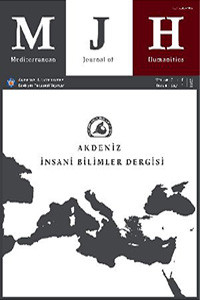Effects of a “Healthy Relationship Development Program” on Conflict Levels of Turkish Adolescent Girls in Relationships
Öz
The aim of this study is to examine the effects of a “Healthy Relationship Development Program” on the conflict levels of female adolescents during their romantic relationships. A pre-test-post-test comparison design was used and there was also a control group. Adolescent girls (aged 18-19 years) who were in a relationship with a romantic partner were included in the study. These girls were selected among students who continued their education in the Inegol Vocational School of Uludag University in Bursa. Experimental and control groups were separately composed of 25 female adolescents. A „Personal Information Form‟, „Conflict in Female Adolescent Dating Relationship Inventory (CADRI)‟ and „Healthy- Unhealthy Relationship Information Form and Program Evaluation Form‟ were used. The pre-test was applied to both control and experimental groups. Then, the „Healthy Relationship Development Program‟ (16 sessions) was performed. After implementation of the program, the post test was carried out on the test and control groups. Relational aggression and the physical, sexual and verbal-emotional abuse levels of female adolescents decreased through the effect of the „Healthy Relationship Development Program‟. Furthermore, it was determined that adolescent girls‟ knowledge of healthy/unhealthy romantic relationships was improved.
Anahtar Kelimeler
Romantic Relationship Adolescence Healthy Relationship Program Abuse Conflict
Kaynakça
- Adler-Baeder F., Kerpelman J. L., Schramm D. G., Higginbotham B. & Paulk A. (2007). “The Impact of Relationship Education on Adolescents of Diverse Backgrounds”. Family Relations 56 (2007) 291-303.
- Aldridge L., Friedman C. & Giggans P. O. (1993). LAACOW in Touch with Teens. Los Angeles Commission on Assaults Against Women. Los Angeles 1993.
- Antle B. F., Sullivan D. J., Dryden A., Karam E. A. & Barbee A. P. (2011). “Healthy Relationship Education for Dating Violence Prevention among High-Risk Youth”. Children and Youth Services Review 33/1 173-179.
- Betz C. (2007). “Teen Dating Violence: An Unrecognized Health Care Need”. J Pediatr Nurs 22 (2007) 427-9.
- Büyüköztürk Ş. (2006). Sosyal Bilimler için Veri Analizi El Kitabı. Ankara 2006.
- Bowman M., la France M., Myhra J. & Edison P. (1994). Chance for Change: A Curriculum for Youth Education and Prevention Around Domestic and Sexual Violence. Chance for change. (Anonymus) 1994.
- Barnett O. W., Lee C. Y. & Thelen R. E. (1997). “Gender Differences in Attributions of Self-Defense and Control in Interpartner Aggression”. Violence against Women 3/5 (1997) 462-481.
- Cascardi M. & Avery-Leaf S. (1998). Building Relationships in Greater Harmony Together: School- Based Dating Violence Prevention Curriculum. Dating Violence Prevention Project. Philadelphia 1998.
- Clark V. A. (2013). Intimate Partner Violence among Adolescents: Causes and Correlates. El Paso 2013.
- Çokluk Ö., Şekercioğlu G. & Büyüköztürk Ş. (20143). Sosyal Bilimler için Çok Değişkenli Istatistik. Ankara 2014.
- Davies R., Davison P. & Safer A. (1994). Healthy Relationships: A Violence-Prevention Curriculum. Men for Change. Chicago 1994.
- Frary R. B. (2000, August 15). Reliability of Test Scores. Source: http://www. testscoring.vt.edu/memo08.html
- Foshee V. A. (1996). “Gender Differences in Adolescent Dating Abuse Prevalence, Types, and Injuries”. Health Education Research 11 (1996) 275-286.
- Foshee V. A., Bauman K. E., Arriaga X. B., Helms R. W., Koch G. G. & Linder G. F. (1998). “An
- Evaluation of Safe Dates, an Adolescent Dating Violence Prevention Program”. Am J Public (1998).
- Foshee V. A & Reyes H. L. M. (2011). Dating Abuse. Chapel Hill 2011.
- Foshee V. A., Benefield T. S., Ennett S. T., Bauman K. E. & Suchindran C. (2004). “Longitudinal Predictors of Serious Physical and Sexual Dating Violence Victimization during Adolescence”. Preventive Medicine 39/5 (2004) 1007-16.
- Foshee V. A., Linder G. F., Bauman K. E., Langwick S. A., Arriaga X. B., Heath J. L., McMahon P. M. & Bangdiwala S. (1996). “The Safe Dates Project: Theoretical Basis, Evaluation Design, and Selected Baseline Findings”. American Journal of Preventative Medicine 12 (1996) 39-47.
- Foshee V. & Langwick S. (20102). SAFE Dates: An Adolescent Dating Violence Prevention Curriculum. Minnesota 2010.
Ayrıntılar
| Birincil Dil | Türkçe |
|---|---|
| Konular | Topluluk Psikolojisi |
| Bölüm | Araştırma Makaleleri |
| Yazarlar | |
| Yayımlanma Tarihi | 30 Aralık 2017 |
| Yayımlandığı Sayı | Yıl 2017 Cilt: 7 Sayı: 2 |

